‘We just buried a mother and two daughters and the father is missing. This is a second Holocaust’
A community shattered: the funerals of Lianne, and her daughters Noiya, and Yahel Sharabi, murdered in Kibbutz Be’eri on 7 October
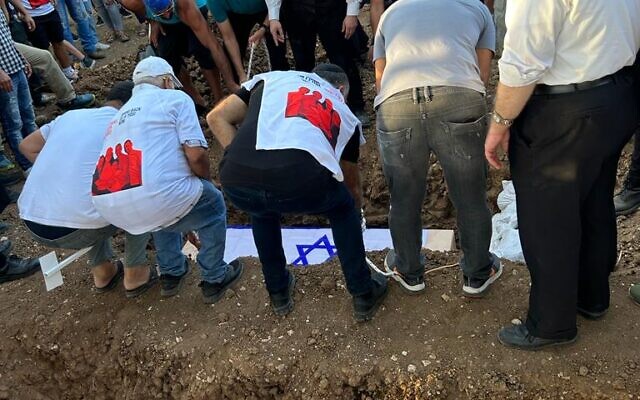
“Hello everyone. I didn’t write anything. As you know, funerals are usually a time to rekindle, and then pick up the pieces, grieve and overcome. But we’re not there. We’re still in the middle of the journey.”
These words, opening one of the eulogies at the funeral of Lianne Sharabi and her daughters Noiya and Yahel, murdered in Kibbutz Be’eri on Saturday 7 October, reflect a strong sentiment in Israeli society.
The feeling that time has stood still over the past two and a half weeks is shared by almost every Israeli. People are holding their breath, anticipating the next step in a war that began with a disaster but is far from over. Regular Israelis are struggling to maintain a routine, work in many sectors has stopped, while casualties are still being identified, missing people are still being found, and above all, the looming issue of the hostages.
The Sharabi family have experienced the complete terrible mix. Shortly after Hamas terrorists stormed Kibbutz Be’eri, they arrived at the house of Eli and Lianne, a UK-Israeli citizen. Lianne and the daughters were murdered in their shelter. Due to the brutality of the murders, Lianne and Yahel could only be identified through DNA samples. Noiya was identified through her teeth only two days ago. Eli’s location and whether or not he is alive remains unknown.
Yossi, his elder brother and Be’eri neighbour was kidnapped to Gaza after he pleaded with the terrorists to spare his wife, Nira, and their three girls. After the terrorists were distracted by Israeli fighters coming to liberate the kibbutz, Nira courageously broke into a half-burnt house, and hid in complete silence for eight hours together with the girls.
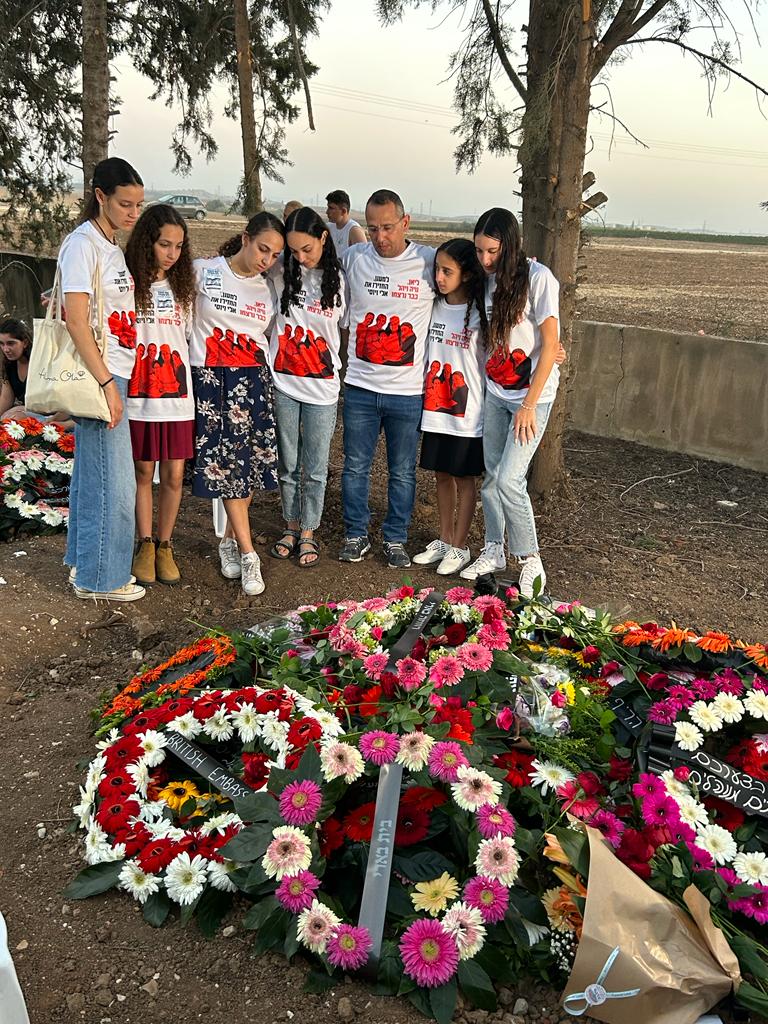
The terrorists also kidnapped Ophir Engel, the boyfriend of Yuval, one of Nira and Yossi’s daughters, who slept over during Shabbat. His grandfather, Yossef, spoke after the funeral with the Jewish News: “On Sunday, we will fly with a delegation to the Netherlands and Denmark to try and convince decisionmakers to apply pressure on Hamas to release the hostages.
“We want to present these horrors to the European public, which I feel don’t comprehend what happened on that Saturday. We just buried a mother and two daughters, when the father is missing. I feel this is a second holocaust. The fact that there are demonstrations supporting Hamas in London, Amsterdam, and Paris, is just crazy. We really need to step up our advocacy.”
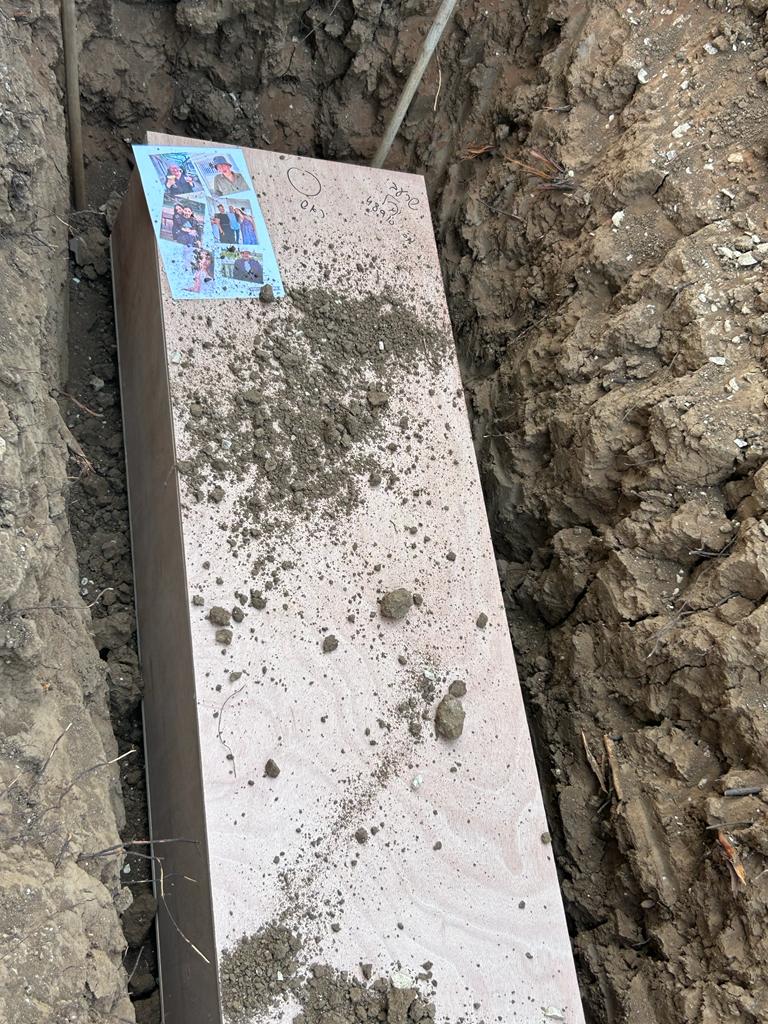
Originally from Bristol, Lianne came to Israel to volunteer in the kibbutz where she met Eli. The two fell in love, got married, and built a family. Through recorded eulogies from her brother and parents in the UK, it was obvious that the family loved the kibbutz, and endorsed her decision to live there, despite the challenging distance.
Lianne’s story is typical Israeli. An English woman marrying a man of Yemenite descent, creating a mix of the best of both cultures.
Be’eri lost approximately 130 of its residents on the Black Saturday, which is more than a tenth of its population. A whole community shattered. One after the other, friends and colleagues from the Kibbutz, classmates of Noiya and Yahel, and their cousins, took turns to say goodbye to their loved ones.
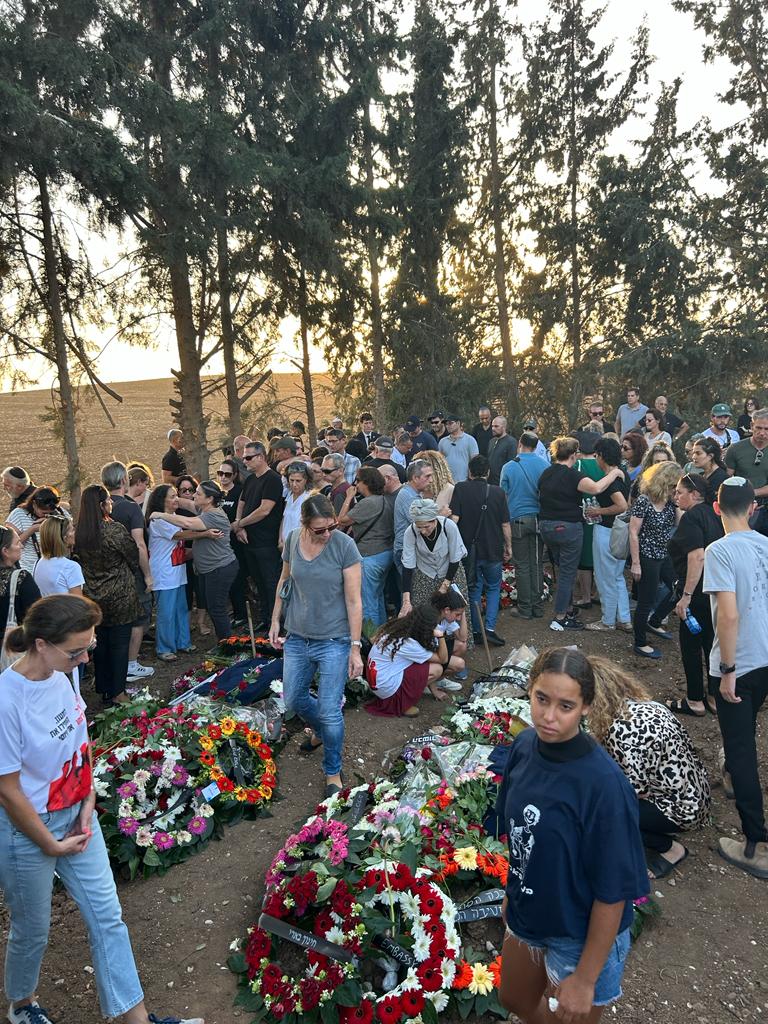
Sharon, the younger brother of Yossi and Eli, broke down during the funeral, and then quickly gathered himself to talk to the press, resembling the strength displayed by Israelis who have taken on the role of telling their stories.
“We don’t know how to cope with one funeral, and here we are burying three family members at the same time. To understand the magnitude of this tragedy, we are just one story out of 200 families of abductees,” he says and goes on to share his experience from October 7.
“I keep Shabbat, and came back from synagogue when a neighbour stopped me and told me that Hamas took control of Be’eri. I held my breath, opened my phone, and my eyes went dark. I had thousands of messages, including my brothers who asked for help, saying they’re surrounded by terrorists and gunshots. I tried to get hold of them, but it was 17:30, and too late. The last messages I got from them were at 10:30 am.”
The story of the hostages is one of the biggest pain points of Israeli society.
Alongside the uncertainty of their conditions and fear of what will happen to them in the hands of Hamas or when the ground invasion begins, there is also huge disappointment from the Israeli government.
Gal Hirsh, who was appointed by Benjamin Netanyahu to manage the efforts to release the hostages, is widely criticised for being chosen due to his relationship with the Israeli Prime Minister rather than his skills.
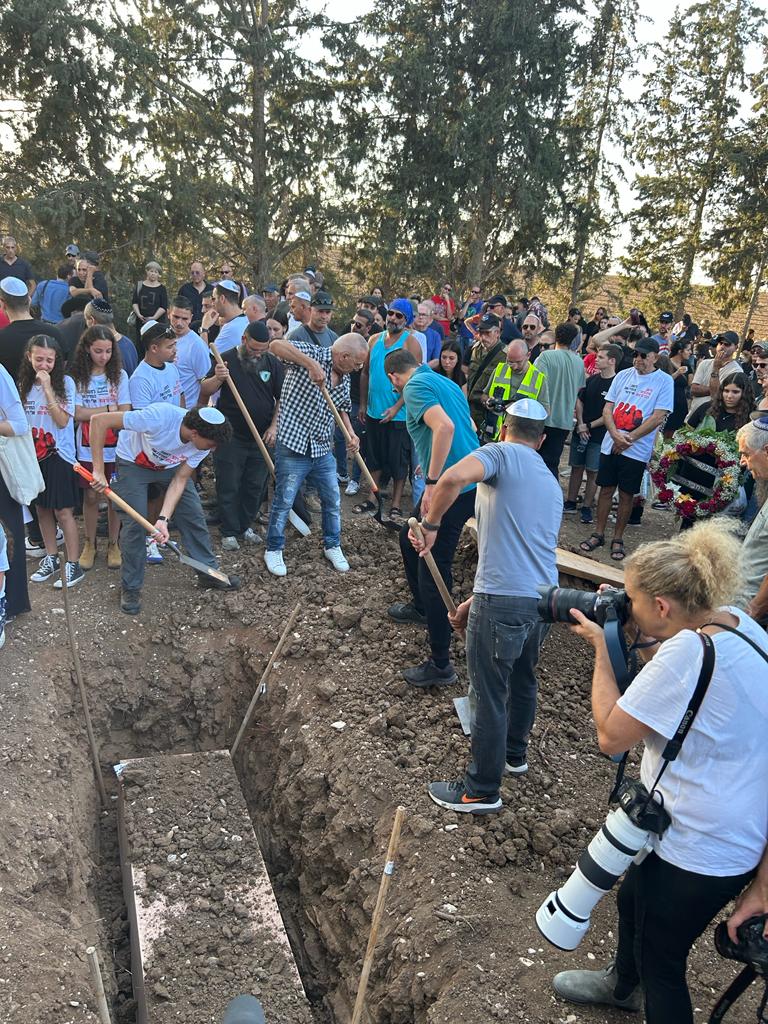
The release of four hostages over the past few days is mainly attributed to the efforts made by foreign powers rather than the Israeli government. But above all, this is another area in which the public feels alienated from its elected officials.
“No government official is supporting us. All of our activities and advocacy are civilian and voluntary. I also don’t see anyone official here. I worked in the public sector for years, with Shimon Peres. I know how these things work, the fact that they’re not involved shows that they’re not in the situation,” says Yossef, Ophir’s grandfather.
Sharon Sharabi echoes the sentiment: “The Israeli public is wrapping us with love. Unfortunately, Israel’s official leadership are not with us. They’re not only keeping us in the dark regarding information, they’re just not showing any compassion, no hug, no offer for help.”
When the coffins are lowered into the ground, the cousins of the Noiya and Yahel become impatient with the many photographers lining up to document their grief.
Like many other victims, they feel that their personal pain became nationalised, and amid the chaos of fleeing the Kibbutz, have barely had time for themselves.
The sun sets over the small cemetery, provides a beautiful setting for the burial of a beautiful family, who only three weeks ago celebrated life and the Jewish holiday of Succot together. The surreal picture portrays the words of the eulogy made by Lianne’s mother to Noiya: “a beam of light, extinguished too soon, but ever in our hearts, always, we will miss her smiling face.”

Thank you for helping to make Jewish News the leading source of news and opinion for the UK Jewish community. Today we're asking for your invaluable help to continue putting our community first in everything we do.
For as little as £5 a month you can help sustain the vital work we do in celebrating and standing up for Jewish life in Britain.
Jewish News holds our community together and keeps us connected. Like a synagogue, it’s where people turn to feel part of something bigger. It also proudly shows the rest of Britain the vibrancy and rich culture of modern Jewish life.
You can make a quick and easy one-off or monthly contribution of £5, £10, £20 or any other sum you’re comfortable with.
100% of your donation will help us continue celebrating our community, in all its dynamic diversity...
Engaging
Being a community platform means so much more than producing a newspaper and website. One of our proudest roles is media partnering with our invaluable charities to amplify the outstanding work they do to help us all.
Celebrating
There’s no shortage of oys in the world but Jewish News takes every opportunity to celebrate the joys too, through projects like Night of Heroes, 40 Under 40 and other compelling countdowns that make the community kvell with pride.
Pioneering
In the first collaboration between media outlets from different faiths, Jewish News worked with British Muslim TV and Church Times to produce a list of young activists leading the way on interfaith understanding.
Campaigning
Royal Mail issued a stamp honouring Holocaust hero Sir Nicholas Winton after a Jewish News campaign attracted more than 100,000 backers. Jewish Newsalso produces special editions of the paper highlighting pressing issues including mental health and Holocaust remembrance.
Easy access
In an age when news is readily accessible, Jewish News provides high-quality content free online and offline, removing any financial barriers to connecting people.
Voice of our community to wider society
The Jewish News team regularly appears on TV, radio and on the pages of the national press to comment on stories about the Jewish community. Easy access to the paper on the streets of London also means Jewish News provides an invaluable window into the community for the country at large.
We hope you agree all this is worth preserving.





















